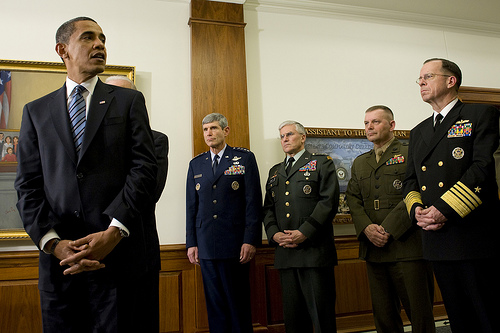If it was hard for senior American officials in Vietnam to get a straight story about how the war was going, it was much harder for senior officials in Washington to do so. Not only were they several thousands miles away, but the military hierarchy actively blocked them from talking to people who would dispute the military’s official story. The John Paul Vann story continued after he returned stateside. Here’s Halberstam’s take:
Vann went home a very angry man, to find that Saigon had ordered that he not be debriefed in Washington. So he began to give his briefing to friends at the Pentagon. It was a professional presentation indeed, and very different from the usual briefings which were coming in from Saigon. What made it striking was that it was not just impressionistic, it seemed to be based on very hard facts. Vann began to get higher and higher hearings in the Pentagon until finally General Barksdale Hamlett, the Deputy Chief of Staff of the Army, heard the briefing, was impressed and arranged for Vann to meet with the Joint Chiefs. Vann was warned by several high officers that above all he must not appear to be critical of General Harkins, who was the personal choice of Maxwell Taylor (by this time Chairman of the Joint Chiefs), since Taylor seemed to be particularly sensitive and protective of Harkins and his reporting…
The Vann briefing was set for 2 PM on July 8, 1963. At 9:45 he sent a copy to General Krulak’s office. A little later Vann, eager, starched, finally getting his hearing, showed up outside the office of General Earle G. Wheeler, the Chief of Staff, to be on hand in case there were any new developments. He was sitting there when a phone call came in to one of Wheeler’s aides. “Who wants the item removed from the agenda?” the aide asked. The voice at the other end spoke for a few minutes. “Is this the Secretary of Defense’s or the Chairman’s office?” There was more talk. “Is that an order or a request?” Then more talk. “Let me get this right. The Chairman requests that the item be removed.” The aide turned to Vann. “Looks like you don’t brief today, buddy.” He went to Wheeler’s office, returned in a minute, picked up the phone, and dialed a number and said “The Chief agrees to remove the item from the agenda.”
The key thing to note here is that the president and Secretary of Defense were almost certainly oblivious to this little power struggle. Moreover, it’s quite possible that Taylor himself was oblivious to the dispute and this was the work of an aide shielding his boss from awkward criticism. Even if Taylor was responsible for spiking Vann’s presentation, it’s safe to say that there were other, less prominent reports from the field that never made it to Taylor’s level, which would have given Taylor the impression that Vann was a huge outlier.
This is one of the major factors that limit the president’s control over the operations of the military. It’s in the nature of the office for the president to only interact with the top couple of layers of the military bureaucracy. This means that virtually everyone he talks to will have gotten a heavily filtered and sanitized version of events. In this case, the reporting hierarchy made the senior leadership too optimistic, but information can be filtered in lots of other ways as well. Any given unit is going to preferentially report information that serves that unit’s interests and suppress information that does not serve those interests. This means that the information that flows up the reporting hierarchy will be strongly biased in favor of the agendas of the people doing the reporting at each level. If the bulk of the military shares some bias—and in a conformist institution like the military they usually will—the information that flows to the top will strongly reflect that bias.
To be clear, this isn’t because people are consciously trying to mislead their superiors. As I’ve mentioned before, officers in a hierarchy inevitably have to abbreviate and summarize the information they report, and it’s just inevitable that their own biases will inevitably sneak into those reports. So if you think the war is going well (or think your superior wants to hear that it is), you’re going to naturally make your report a little more optimistic than is otherwise warranted. Similarly, if you want to take some action (say, invading a particular Middle Eastern country), you’re going to be somewhat more likely to report information that supports an invasion, and somewhat less likely to report information that would support the case against it.
In the aggregate, this means that the military naturally provides the president with a lot of information supporting decisions the military brass support, and much less information that would support contrary decisions. A president that wants to follow his generals’ advice will always have evidence at his fingertips to defend his decision to Congress and to the general public. In contrast, a president who overrules the military brass will find that his opponents in Congress will have such ammunition at their fingertips, fed to them by top military officials. This doesn’t force presidents to do what their generals want, but it means that all the forces of inertia are on the military’s side. Fighting the military bureaucracy is an exhausting process—even when they technically report to you—because your non-military staff has to do much of the intellectual legwork that would otherwise be done by the military hierarchy itself.



